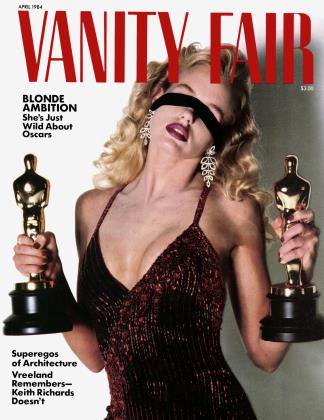Sign In to Your Account
Subscribers have complete access to the archive.
Sign In Not a Subscriber?Join NowOnly Connect
A fantasy for the ’80s
RAFAEL has a brand-new XVRolodex. It’s motorized, with freeze-frame, remote, and four forward speeds. Sometimes at night we take it out for a spin. I call off addresses; the awnings flash past; he shouts out the numbers and names.
Rafael knows everyone. Last week he took me to a dinner party for the ten sequential phone numbers up from his on the MUrray Hill 8 exchange—4339 to 4348—a buffet. It was terrific: the group was charming; we danced until three. On Wednesday we attended a small luncheon for the Fifth Avenue #4 Bus standees. I put my change in the slot, said good afternoon to the driver, but didn’t know a soul— I was so relieved when Rafael came. This afternoon I dropped by R’s office to chat, but he was busy, curled up in the fetal position, taking calls from the President, from Donna Summer, and from that nice man who decoded DNA. I decided to wait.
Of course, Rafael is famous. His latest book is The History of the Party, from earliest times. He treats, definitively, mixed drinks of the Jurassic, early party lists, and the evolution of dip. Before that he did an anthology of unreturned phone messages. And before that, a cassette study set called Party Skills: Beginners, Intermediates, Advanced. But his big book was Clout. He made a fortune on the television spin-off when it went into syndication. It was a game show called Bureaucratic Ordeal. The contestants had to rent cars without credit cards, petition for zoning variances, and obtain large charge accounts, after being declared MIAs.
Rafael is distinguished, as well. This week he gives a seminar on table seating to the American Association of Maitre d’s at the research department at Elaine’s. And Friday night there’s going to be a reading of his address book at the Ninetysecond Street Y. After which we dine with his shrink.
These days, I guess, I’m as close to Rafael as anyone. Since his last divorce he hasn't been seeing anyone in particular. To keep himself company around the house he plays a cassette of a woman’s voice. “Honey,” it asks, “get me a glass of something.’’ “Honey, come to bed.” The “on” switch is hooked up to an ultrasonic sensor, so the cassette begins to play when he walks in the door. It’s a Sony; it asks, “Honey, why were you out so late?’ ’
He chats with his kids on the ham radio set and watches videocassettes of his parents before they died. On the mantel there’s a photo of Rafael with his arm around the Pope. The Pope is laughing, and there’s a joke inscribed in vulgate that I don’t understand.
Rafael is, I think, a pretty regular guy, compared with most people in his position. He keeps a file of lunch dates on his VDT, and every Thursday punches in an intimate little dinner for his closest friends. They sit down around his table and, in alphabetical order, break bread. And Rafael really cares about his friends: if you’re feeling low he composes a Personal ad for you; if you’re out of the columns, he hires someone to walk behind you casually praising your work. He even spends time on people with whom the relationship isn’t 100 percent tax deductible. At rush hour once, I saw him hire a radio cab just to sit in the backseat and listen to the dispatcher call out friends’ names.
This week, while cruising around in his Rolodex, we’ve been going over Rafael's speech. He wants to address the whole eastern time zone with some personal remarks—personally, I think a couple of contiguous zip codes is enough. But Rafael complains that a 30-share of his acquaintances is insufficient reach. So we’re going with the satellite linkup and engraved note cards, followed by some 800-line Q& A. Get this: Last night Rafael told me that some people think broadcasting is impersonal. But he disagrees. “In friendship,” he says, “name recognition is everything.’
—Frederick Iseman
 View Full Issue
View Full Issue












Subscribers have complete access to the archive.
Sign In Not a Subscriber?Join Now